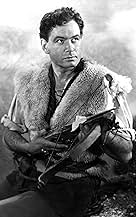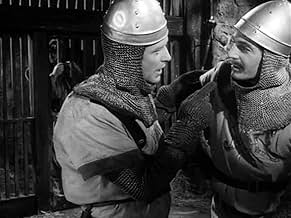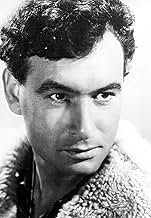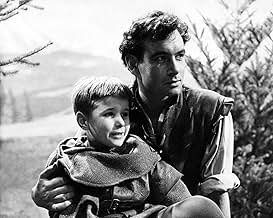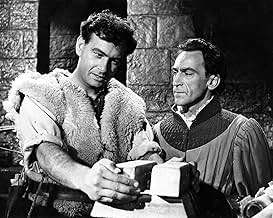Füge eine Handlung in deiner Sprache hinzuDepicts the legend of William Tell, who, as the stories say, shot an apple off of his son's head and lead the rebellion to free Switzerland.Depicts the legend of William Tell, who, as the stories say, shot an apple off of his son's head and lead the rebellion to free Switzerland.Depicts the legend of William Tell, who, as the stories say, shot an apple off of his son's head and lead the rebellion to free Switzerland.
Folgen durchsuchen
Empfohlene Bewertungen
I remember seeing the TV series of William Tell in the late 50s when I was at school, and I thought it was great then, with Conrad Phllips as William, and Willoughby Goddard as the Fat Villain lol. and the real excitement for a 30 minute series was superb for the time and obviously aimed at a child audience. I then saw a re run of the series on sky in the 90s and it was still really good entertainment even for adults. I even saw a very early appearance of Michael Caine in a minor role (Just shows you eh) and quite a few other actors who become better known later in their careers. Well worth a look for anyone who likes a good simple adventure jaunt from a long while ago which I think has kept it's bite through the years.
Some of the series were filmed near where I lived in North Wales. The film company hired my pony for some of the scenes when he was rode by Hedda Tell (Jennifer Jane). I was fortunate enough to get a week off school to take my pony down to the 'set' each day and stay the day. It was quite an experience for a 10 year old! I still remember those days with fond memories especially when our local doctor was travelling past the set very early one morning. He did not know about the shoot and was very taken aback when he saw several men in medieval army dress appear from behind the rocks!
There was also an interesting scene on the lake when one boat (containing soldiers) were firing arrows at another. I was fascinated to see that the actors in the boat being fired at stuck the arrows in the side of the boat themselves!!
There was also an interesting scene on the lake when one boat (containing soldiers) were firing arrows at another. I was fascinated to see that the actors in the boat being fired at stuck the arrows in the side of the boat themselves!!
Conrad Phillips stars in the 1950s action adventure series - William Tell. Set in the fourteenth century during the hostile Austrian occupation of Switzerland, William Tell is a reluctant freedom fighter, battling heroically against the tyranny and oppression of the invading forces. William tell is the Swiss version of Robin Hood. Conrad Phillips plays the protagonist fantastically. It is possible that Pascal Bugnion would have had greater success in the role, but he was unavailable at the time of filming. The classic action show is made up of series of 39. The episodes are in black and white, but this does not detract from the entertainment in any way.
I remember this series from years ago when it was shown on UK TV. Watching the box-set episodes in quick succession, certain observations come to mind. Conrad Phillips as William Tell is well cast as the hero, and Willoughby Goddard makes a great Gessler, but after a while, the episodes with Tell and Gessler take on a similar pattern with Tell getting the better of Gessler. The other cast members are interesting for different reasons though.
Walter Tell (Richard Rogers) appears regularly to start with and then disappears for a long time; but Hedda Tell (Jennifer Jayne) is the most interesting. She is no shrinking violet and readily picks up crossbow and sword and pitches in when necessary; maybe she is TV's first Feminist before the word Feminist was invented: and she also starts off regularly but her appearances diminish with time. Could the viewing lads and lasses have found Hedda more appealing than William? An actor's ego can be a fragile thing.
Also of interest are the minor cast members who would go on to greater things - among them Christopher Lee, Patrick Troughton, Warren Mitchell and an early appearance of Michael Caine.
All things considered, the cast and crew did a fine job producing an adventure series which has stood the test of time and is worth watching today.
Walter Tell (Richard Rogers) appears regularly to start with and then disappears for a long time; but Hedda Tell (Jennifer Jayne) is the most interesting. She is no shrinking violet and readily picks up crossbow and sword and pitches in when necessary; maybe she is TV's first Feminist before the word Feminist was invented: and she also starts off regularly but her appearances diminish with time. Could the viewing lads and lasses have found Hedda more appealing than William? An actor's ego can be a fragile thing.
Also of interest are the minor cast members who would go on to greater things - among them Christopher Lee, Patrick Troughton, Warren Mitchell and an early appearance of Michael Caine.
All things considered, the cast and crew did a fine job producing an adventure series which has stood the test of time and is worth watching today.
Having just re-watched and enjoyed Richard Greene's ADVENTURES OF ROBIN HOOD series, my wife and I decided to check out some of the other 1950s British historical adventure shows. As my father's family had immigrated from Switzerland around the turn of the 20th century and established themselves in America, the logical choice was WILLIAM TELL.
I had grown up with Tell memorabilia at home and had read Friedrich Schiller's play which is the best known version of the William Tell story. Because of my familiarity with the story, I was really looking forward to this series. After sitting through all 39 episodes which we watched on a regular basis, my wife and I came away very disappointed. There were many reasons for this.
First up is Conrad Phillips as William Tell. While he wasn't bad, he lacked the charm and the charisma of Richard Greene but it wasn't entirely his fault. Much of the blame can be laid at the feet of the scriptwriters. In the beginning it was Tell and his family and there was a certain lightness and a touch of humor to Phillips' performances. This disappeared as the tone of the series became darker.
In contrast to Phillips, Willoughby Goddard who played Tell's nemesis Gessler went in the opposite direction. Goddard, who resembles Orson Welles in height and girth (Schiller's Gessler is not obese), started off as an intimidating figure but soon became a caricature of Henry VIII including dressing like him in robes and with chains of office. He even devoured his meals like Charles Laughton from the 1933 movie.
As other reviewers have pointed out, the series developed a WW II resistance aura where Tell's family disappears after a few episodes with the occasional appearance of Hedda his wife and a Little John like character known as "The Bear". Tell is constantly referred to in the later episodes as "the leader of the Swiss Resistance". The later episodes also have a sameness to them. Tell goes to other areas of Switzerland, like an avenging angel, to deal with the "Austrian dogs" by killing many of them.
In addition to Phillips and Goddard there's Jennifer Jayne as a feisty Hedda Tell and character actor Nigel Green does his best with the underwritten and underdeveloped role of "The Bear". Most of the reviewers had the opportunity to see WILLIAM TELL as children and carry their fond memories with them. My wife and I did not, which robs the series of any nostalgia value for us. We didn't hate the show but we won't be revisiting it any time soon...For more reviews visit The Capsule Critic.
I had grown up with Tell memorabilia at home and had read Friedrich Schiller's play which is the best known version of the William Tell story. Because of my familiarity with the story, I was really looking forward to this series. After sitting through all 39 episodes which we watched on a regular basis, my wife and I came away very disappointed. There were many reasons for this.
First up is Conrad Phillips as William Tell. While he wasn't bad, he lacked the charm and the charisma of Richard Greene but it wasn't entirely his fault. Much of the blame can be laid at the feet of the scriptwriters. In the beginning it was Tell and his family and there was a certain lightness and a touch of humor to Phillips' performances. This disappeared as the tone of the series became darker.
In contrast to Phillips, Willoughby Goddard who played Tell's nemesis Gessler went in the opposite direction. Goddard, who resembles Orson Welles in height and girth (Schiller's Gessler is not obese), started off as an intimidating figure but soon became a caricature of Henry VIII including dressing like him in robes and with chains of office. He even devoured his meals like Charles Laughton from the 1933 movie.
As other reviewers have pointed out, the series developed a WW II resistance aura where Tell's family disappears after a few episodes with the occasional appearance of Hedda his wife and a Little John like character known as "The Bear". Tell is constantly referred to in the later episodes as "the leader of the Swiss Resistance". The later episodes also have a sameness to them. Tell goes to other areas of Switzerland, like an avenging angel, to deal with the "Austrian dogs" by killing many of them.
In addition to Phillips and Goddard there's Jennifer Jayne as a feisty Hedda Tell and character actor Nigel Green does his best with the underwritten and underdeveloped role of "The Bear". Most of the reviewers had the opportunity to see WILLIAM TELL as children and carry their fond memories with them. My wife and I did not, which robs the series of any nostalgia value for us. We didn't hate the show but we won't be revisiting it any time soon...For more reviews visit The Capsule Critic.
Wusstest du schon
- VerbindungenFeatured in Children's TV on Trial: Inventing Children's Television: The 50s (2007)
Top-Auswahl
Melde dich zum Bewerten an und greife auf die Watchlist für personalisierte Empfehlungen zu.
- How many seasons does William Tell have?Powered by Alexa
Details
- Erscheinungsdatum
- Herkunftsland
- Sprache
- Auch bekannt als
- Guillermo Tell
- Drehorte
- Produktionsfirmen
- Weitere beteiligte Unternehmen bei IMDbPro anzeigen
- Laufzeit
- 30 Min.
- Farbe
- Seitenverhältnis
- 1.33 : 1
Zu dieser Seite beitragen
Bearbeitung vorschlagen oder fehlenden Inhalt hinzufügen

